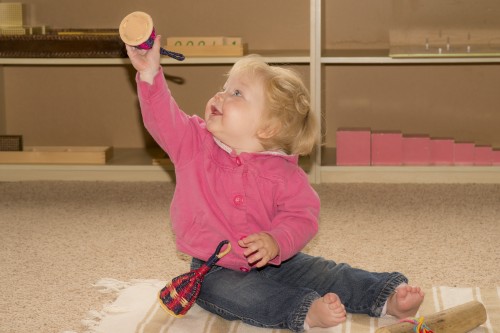 Toddler (2 years)
Toddler (2 years)
In this early stage, we maintain small class sizes and a 1:5 teacher/child ratio to promote an intimate and safe environment. The emphasis is on creating a warm, loving and caring atmosphere in which children can adapt easily to new social interactions with both peers and adults. The toddler classroom abounds with child-sized furniture. The Montessori work is within their reach. Having access to these materials fosters confidence as they choose their own work. The children also enjoy music, dancing, finger plays, and various art experiences.
A favorite in the toddler classroom is practical life. This is the age where they begin to crave independence. A child of this age becomes absorbed in the task of putting items in containers, closing them, and taking them out again. They are anxious to learn how to wipe a table, how to pour from one pitcher to another, and how to use tongs to transfer objects from bowl to bowl.
The beginning of the language arts curriculum starts here. Children develop phonemic awareness (the knowledge that words are made up of sounds) through verbal games with their teacher. Once they understand that words are made up of sounds they begin to connect those sounds to their symbols through the introduction of sandpaper letters. By tracing the sandpaper letters with their fingers they are entering the beginning stages of letter formation, writing.
At this stage, the children are exposed to basic math concepts. An emphasis is placed on recognizing quantities and the numerical symbol that corresponds. Many of their music and movement games also incorporate math concepts.
Toilet Learning
Maria Montessori believes that young children have “sensitive periods” in which they focus immensely on one task. During the potty training phase, which starts at 10 to 12 months according to Montessori professionals, parents and teachers must foster training by providing the appropriate tools. This early-age toilet training philosophy advocates routine, awareness and independence as the child works towards his freedom from diapers. Children will be encouraged to sit on the toilet if they wish, but will never be forced to.
Toilet learning starts with readiness signs, and is not learned through a reward system. Toileting is a skill that needs to be learnt. It cannot be taught overnight. The key to toilet learning is teaching not training the child. Learning on their own is reward enough for them to be able to independently help themselves in remaining clean or not soiling themselves.
Allow the child to learn on their own with a bit of support and help from the adult with the use of toilet training pants and clothes they can independently put on themselves. Toilet learning is linked to the child’s self-esteem, so genuine verbal praise is important. There are no ‘accidents’ during toilet learning, only lessons. Language also plays a big part in keeping a positive attitude with toilet learning.
Children who attend Montessori Canyon Academy will be assisted with all toilet learning processes in a positive manner.
Our Toddler program options are as follows:
Morning 8:30-11:30am 5 days, MWF, T/TH
Daily Schedule
Here is a typical daily schedule in our Toddler preschool class.
8:30-10:00- work period
10:00- 10:15- snack
10:15-10:30 – circle time
10:30-11:00 – recess
11:00 – 11:30 – closing circle time/ pick-up
